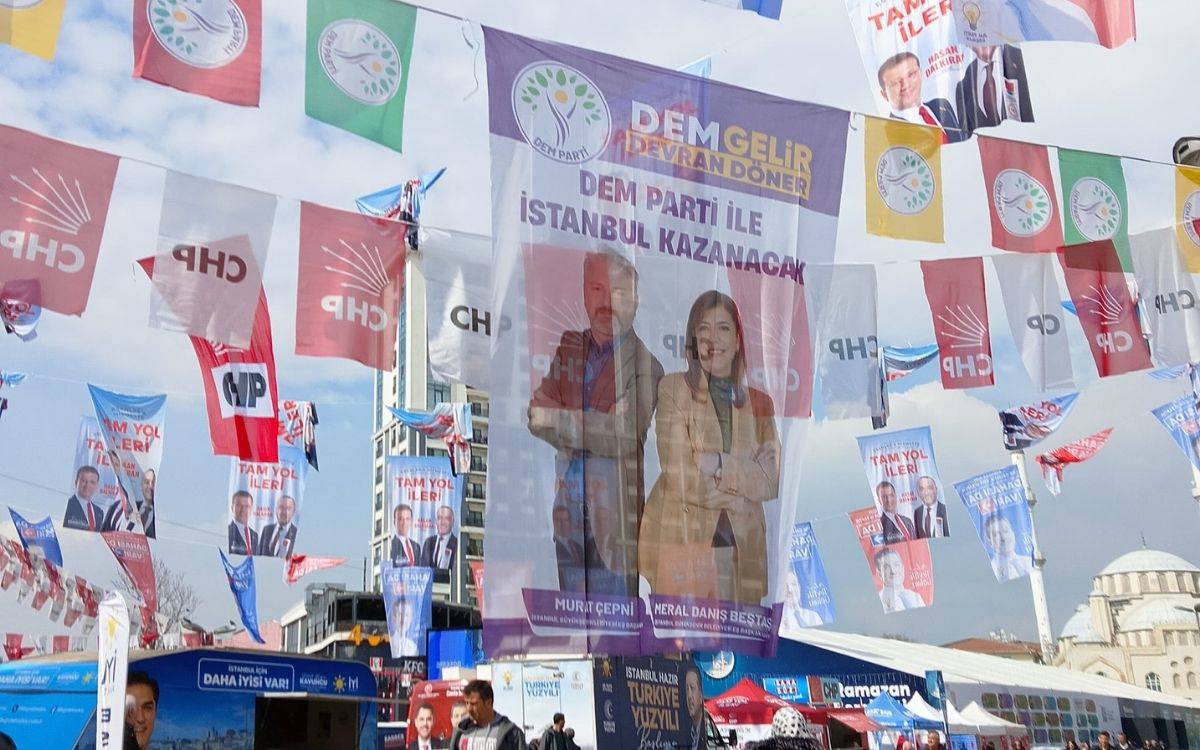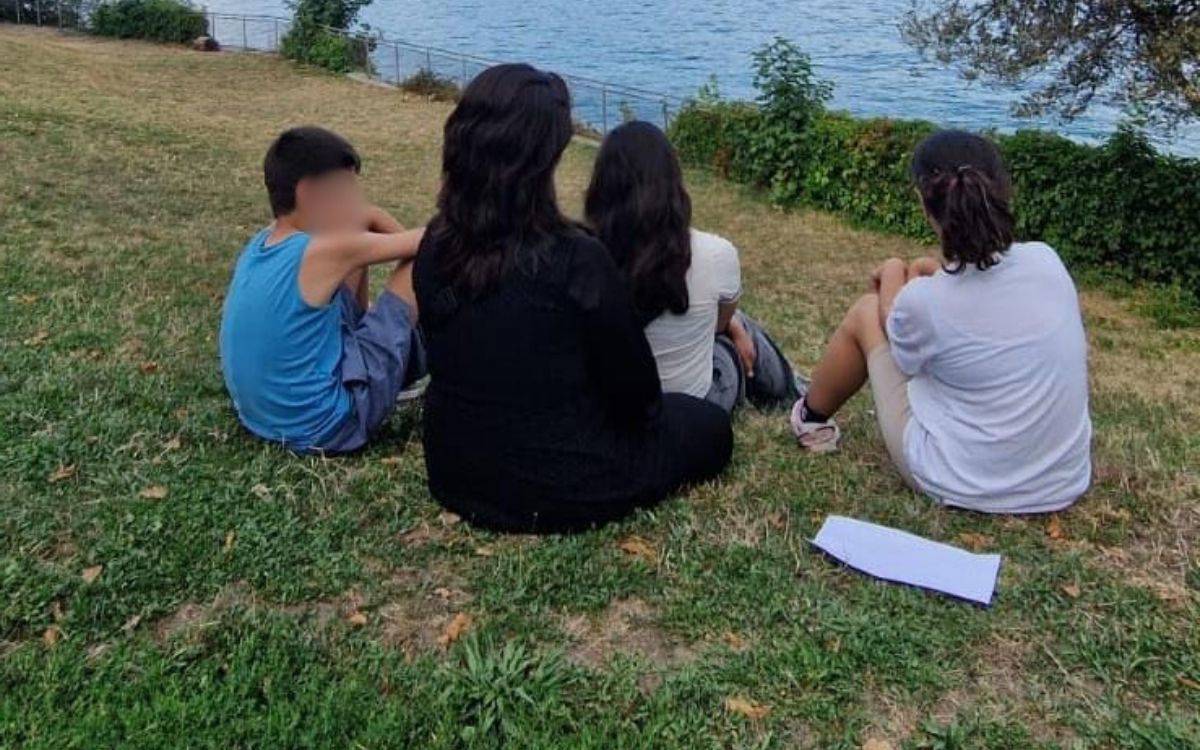"May the Creator spare one from the pain of losing a child. In these blessed days, we believe that fraternity should prevail in this country. Our religion is love. May our offerings to Khidr be accepted. Let faith be filled with love and light…"
An election campaign visit of the İstanbul co-candidates from the Peoples' Equality and Democracy (DEM) Party, Meral Danış-Beştaş and Murat Çepni, to a cemevi, an Alevi place of worship, starts with this Alevi prayer
We are at the Garip Dede Cemevi in Küçükçekmece, İstanbul. The person reciting the prayer is Celal Fırat, an DEM deputy representing İstanbul and an Alevi cleric (dede).
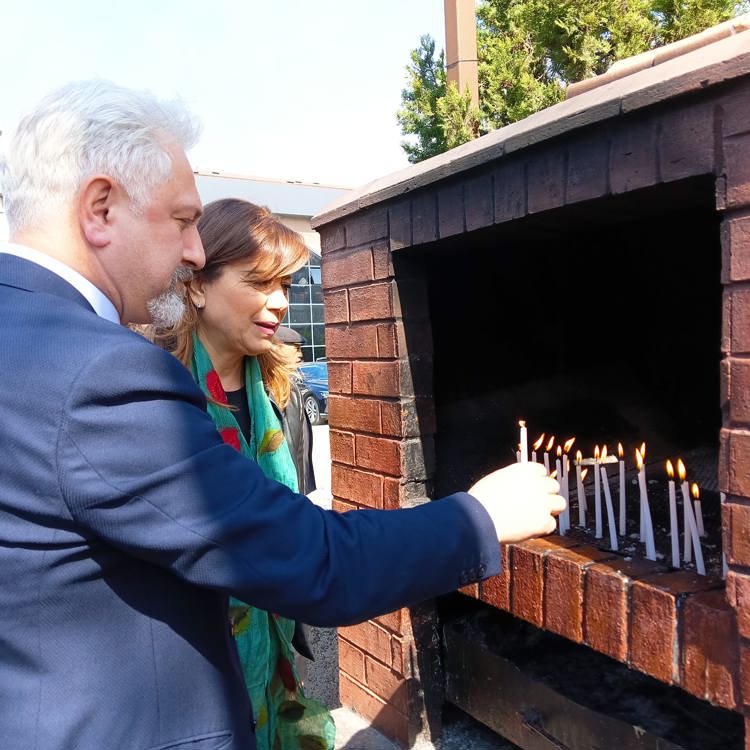
Prior to this, the candidates gather with Alevi citizens in the courtyard of the cemevi, some lighting candles and making wishes
Later, the candidates gather with Alevi citizens in a large hall. Speaking first, Murat Çepni says that the Alevi minority is going through a very challenging period and that they have thwarted attacks with their struggles even during this difficult time.
"Cemevis are places of worship," says Danış Beştaş, who speaks next, expressing her respect for the resistance and faith of the Alevi community and their ability to stand together despite the divisive policies of the government. Criticizing the government for not granting cemevis the status of places of worship, she says, addressing the government, “Cemevis are places of worship. No matter how much you say otherwise and pass laws, it is not a law for us; our belief and legitimacy are important to us. Just like everyone else, they know that cemevis are places of worship.”
As the speeches continue, I ask Alevi citizens how they view the candidates. They first mention the economic difficulties rather than the candidates.
Some say, "It's great that they came here to visit us," while others say, "We are proud of them; these are our leaders."
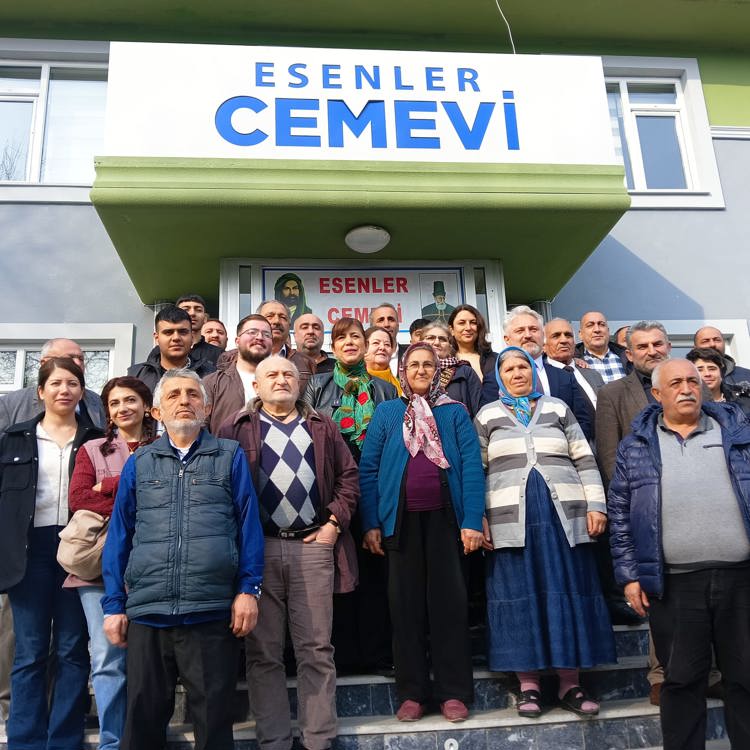
Our second stop with the Danış-Beştaş and Çepni is a public gathering in Esenler.
The election stand of the DEM is set up in Esenler Square, right next to stands of parties like Hüda Par, İyi Party, and Zafer Party. The insides of the stands are empty; you only see party flags. Many police officers observe the election stands of all parties in the square.
It's evident that the citizens waiting for the candidates at the DEM stand are excited. When Kurdish music starts playing, dances and slogans begin. It feels like you're at a small election rally rather than an election stand. That's when the DEM candidates arrive, and at that moment, you feel like you're at a mini-election rally rather than an election stand.
Will DEM voters vote for İmamoğlu?
In İstanbul, it's a matter of great curiosity whom Kurdish voters will vote for in the mayoral race, as Kurdish votes are seen as a "swing vote" that will affect the outcome of the race between Ekrem İmamoğlu, who aims for re-election, and the ruling party's candidate, Murat Kurum.
While many of those I meet in the square say, "We will vote for ourselves, for our candidates," some say, "We divided the votes at home; my spouse and I will vote for DEM, and the children will vote for İmamoğlu, as long as Kurum doesn't win."
A DEM voter, a woman, says, "Our goal is not to make others lose. We are here, we are strong, and we want to show this to everyone." Expressing satisfaction with her party's decision to field its own candidates instead of supporting İmamoğlu as they did in the 2019 election, the woman says, "We support our party's decision."
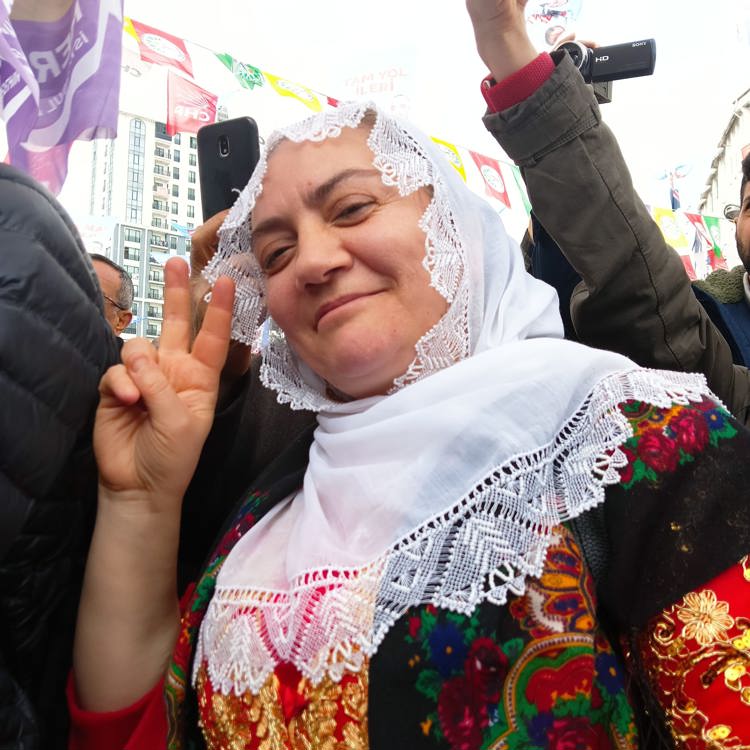
After the speeches, we go to the opening of the DEM Election Office in Tuna Neighborhood, Esenler. Tuna Neighborhood is a crowded neighborhood where mostly Roma and Kurdish citizens live together.
The AKP's candidate for re-election as district mayor is Tevfik Göksu. Interestingly, the AKP Election Office and the DEM Election Office face each other in Tuna Neighborhood. The AKP Election Office closes its shutters as soon as the DEM candidates arrive. Plainclothes police officers also begin to wait in front of the AKP Election Office.
I ask passing citizens about the AKP and DEM candidates; some prefer to remain silent and not comment, while one citizen says he will vote for the CHP's candidate, Ekrem İmamoğlu, for metropolitan mayor and has not yet decided for the district.
Since the candidates have not arrived yet, I ask DEM voters about the party's candidate policy. A woman named Berfin says, "We are an organized community; we know what our party is doing, and we trust it. I fully support my party's decision to field its own candidates. I will vote for our candidates both in the district and the metropolitan municipality."
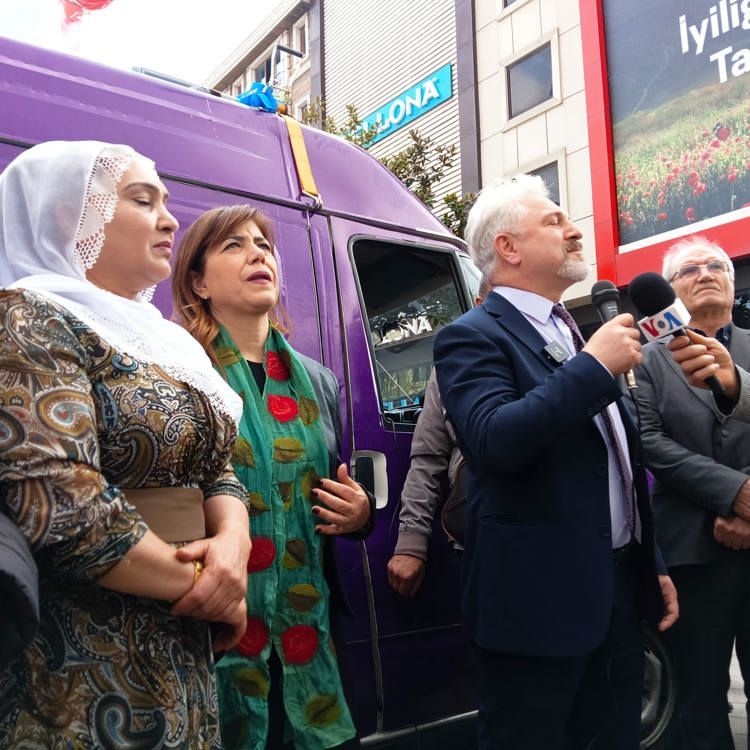
Selvi Kaldır, another woman, criticizes the CHP, saying, “They always saw us as an easy target. They didn’t accept our will, our desires. Kurds only come to mind during election time. We didn't accept this approach. We stand behind our party's decision.”
The last stop with the DEM candidates is once again a cemevi. The election campaign, which started at the Garip Dede Cemevi, ends at the Esenler Cemevi.
"Everything is very expensive"
The DEM candidate starts a conversation with Alevi citizens. While the conversation continues, I seize the chance to listen to Alevi women.
"I especially love Meral," says one woman, while another emphasizes, "They should visit us more often."
When I ask, "What are your expectations from the candidates?" I get the following response:
"We can't afford to go to the grocery store; everything is very expensive. Rents are high. We were getting by on my husband's salary; he was retired. My husband died, and we are completely broke..."
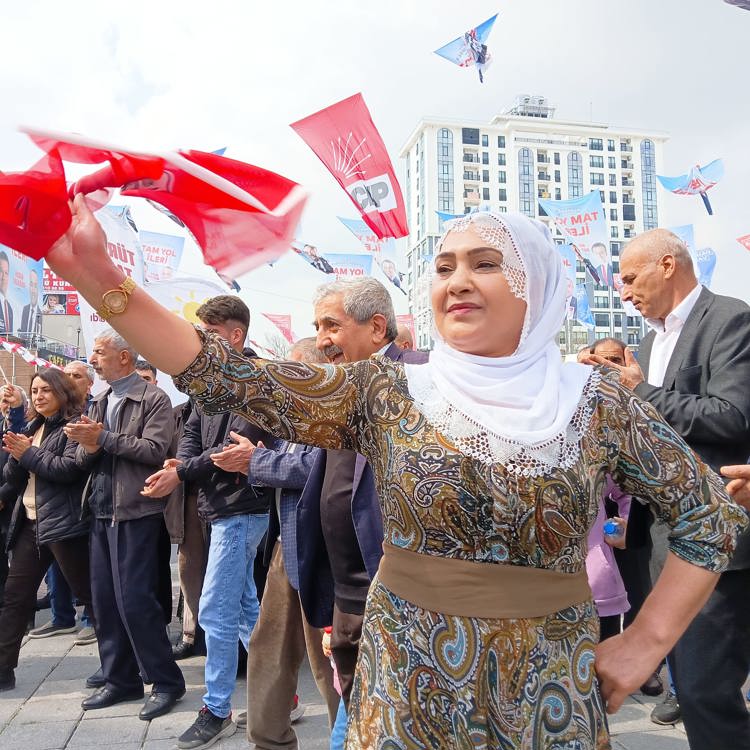
Following the 2023 presidential elections, the party entered a self-criticism process due to the frustrating election results. Citizens came together through neighborhood councils, the women's movement, and district party councils to discuss ideas.
Looking at the field, it seems that the criticisms and suggestions of the wider DEM Party base, particularly the Kurdish voters in İstanbul, who were highlighted at that time, for the party to "field their own candidates" and "have candidates who speak Kurdish," have been addressed.
The intense interest of voters in the candidates and the fact that the candidates start their speeches in Kurdish each time indicate that the DEM Party, which faced criticism in the previous elections for "losing touch with its voter base," has taken these criticisms into account.
The party's candidates address both national politics and İstanbul's issues. For example, while Murat Çepni talks about national politics, Meral Danış-Beştaş addresses specific issues in İstanbul such as earthquakes, population, and women's issues. In the next meeting, Çepni presents his proposals for local politics, while Danış-Beştaş lists her criticisms of the AKP.
Danış-Beştaş also inevitably mentions Gültan Kışanak, with whom she has worked in politics for many years and who is currently in prison.
Considering the media embargo on the DEM Party, it is unknown to what extent the situation in the field is reflected on the screens. However, the energy of the DEM Party, the communication and relationship of the candidates with the citizens, reveal the difference of an "organized people."
"Newroz was fantastic"
Throughout the day-long election tour with the DEM's İstanbul Metropolitan Municipality Co-Mayor Candidates Danış-Beştaş and Çepni, we had the opportunity to chat. Here are the responses from the DEM Party İstanbul candidates:
How do you evaluate the high participation in İstanbul Newroz?
Danış-Beştaş: Newroz was fantastic. It was the most magnificent Newroz of recent years, we won at Newroz. Everyone saw this. Everyone saw the stance and power of İstanbul.
Çepni: Newroz expressed the voice and words of our people. Our people spoke, they spoke in the squares. The real election campaign is there. For those who ask 'Where is DEM?' the answer is there. The participation was high, and I think this will be reflected on March 31.
How is the election campaign going?
Danış-Beştaş: We think it's going very well. Everywhere we go, we see love, interest, and solidarity. It's difficult for us to have direct contact everywhere; our provincial and district organizations are also working, and we see good results.
What do you want to say about Gültan Kışanak?
Danış-Beştaş: Not a single one of our friends should spend even a single day in prison. Our friends are hostages. We worked with Gültan Kışanak. She is now a candidate from Ankara. She is a great opportunity for both women and Ankara. We send our regards from here to Kandıra. If we weren't in İstanbul, we would be in Ankara. We are also running her campaign together there. (EMK/VK)






